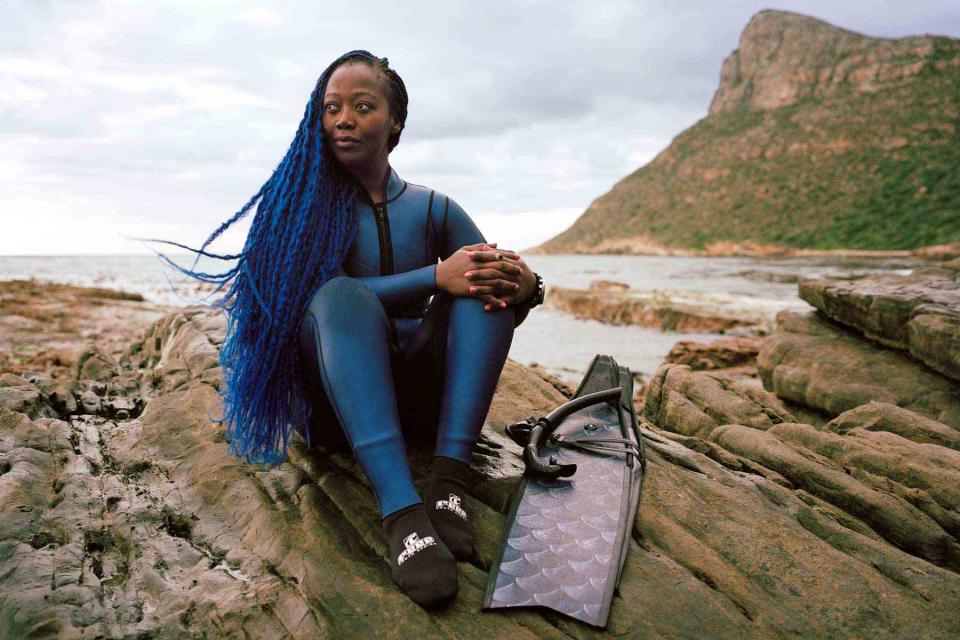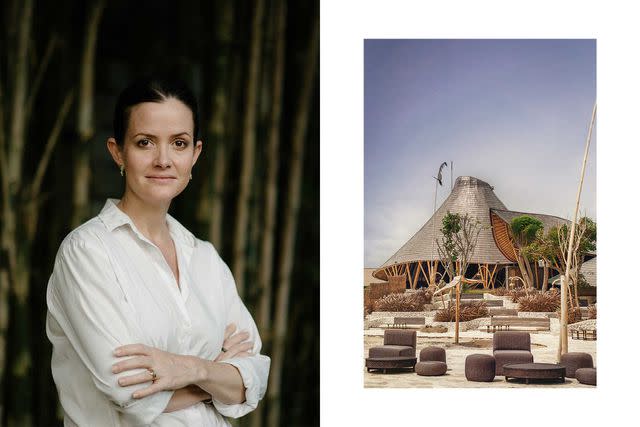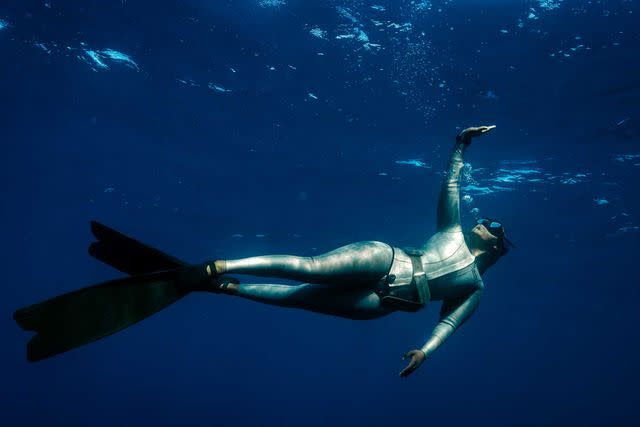Meet 2 Women Championing Smart Solutions in Sustainable Building and Ocean Access
These Global Vision Awards honorees are making strides in sustainable architecture and environmental equity.

Verity FitzGerald
Free diver Zandile Ndhlovu at Smitswinkel Bay in Cape Town.The Travel + Leisure Global Vision Awards aim to identify and honor companies, individuals, destinations, and organizations that are taking strides to develop more sustainable and responsible travel products, practices, and experiences. Not only are they demonstrating thought leadership and creative problem-solving; they are taking actionable, quantifiable steps to protect communities and environments around the world. What's more, they are inspiring their industry colleagues and travelers to do their part.
Big ideas don’t always yield big impact, but these forward-thinking leaders demonstrate just how much can be accomplished when clarity, conviction, and passion are applied to solving a problem. The two honorees in this category both focus their attention on an issue that directly impact the destinations closest to their hearts. For Elora Hardy, it’s designing and developing buildings in Indonesia made from environmentally friendly bamboo. Zandile Nhdlovu’s mission is to instill a passion for and, importantly, provide equitable access to the ocean for fellow Black South Africans. At first glance, their purposes may be narrow and singular in scope, but the framework developed by each woman has the potential to be applied to similar problems in other areas of the world. — T+L Editors

From left: Suki Zoe; Courtesy of Mari Beach Club Bali
Elora Hardy’s firm, Ibuku, designs ecofriendly buildings like Bali’s Mari Beach Club (right), made of bamboo, wood, and copper.Elora Hardy, Ibuku
When Elora Hardy pivoted from a successful career as a graphic designer in New York City, she thought back to her childhood home of Bali, where her father, John Hardy, had begun his jewelry business in 1975. She moved back to Bali with a different focus in mind: bamboo.
The plant, one of the most abundant and sustainable materials in Indonesia, is ideal for eco-friendly construction. It becomes fully grown after about seven years, has the tensile strength of steel, and absorbs and stores more carbon than softwood trees.
In 2010, Hardy founded Ibuku, a design firm in Bali that has planned more than 200 bamboo structures, including one of the island’s tallest bamboo buildings, a six-story private home named Sharma Springs (available for rent on Airbnb). In 2019, Hardy received an honorary Royal Designer for Industry award from the United Kingdom’s Royal Society of Arts.
While much of Ibuku’s work takes place in Bali, in 2015 she began a project on another Indonesian island, Sumba: a mostly bamboo school for the Sumba Hospitality Foundation that provides vocational training (including internships at resorts) and classes in permaculture and other responsible farming practices. In addition to securing internships at the island’s growing number of resorts, its own hotel, Maringi Sumba, gives students hands-on experience in both guest services and eco-friendly development. — Tom Vanderbilt

Jacki Bruniquel/Courtesy of Zandile Ndhlovu
Zandile Ndhlovu diving at Sodwana Bay.Zandile Ndhlovu, The Black Mermaid Foundation
Zandile Ndhlovu first saw the ocean when she was 12 years old. “I remember being transfixed by those massive, crashing waves,” she says. Ndhlovu had grown up away from the water in the township of Soweto, in South Africa; more than two decades later, she is the country’s first Black African PADI-certified free-diving instructor.
In 2020, Ndhlovu launched the Black Mermaid Foundation, an organization that works to increase diversity and inclusion in oceanography by teaching diving to adults and snorkeling to children. The programs include an introductory, confined-water class; a two-day PADI-certified course; and a snorkel and diving exploration trip. She’s also expanding her offerings to include swim lessons for kids, so children of all ages and abilities have the opportunity to feel comfortable in the ocean.
By increasing access to the water, Ndhlovu says, a door opens for a more diverse future: “Professionally, we could see more marine biologists of color — more oceanographers, more underwater wildlife filmmakers — entering the ocean space.” — Hannah Selinger
For more Travel & Leisure news, make sure to sign up for our newsletter!
Read the original article on Travel & Leisure.

